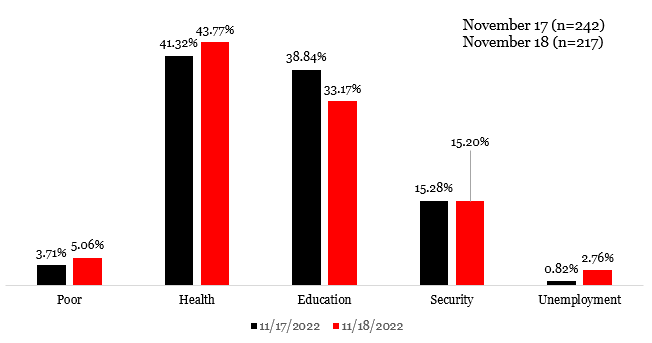
The 17th of November, 2022, was not the first time Nigerians heard about the level of poverty in rural and urban areas. It was not the first time that national, regional, and global organizations had informed the Nigerian government and other stakeholders that people were struggling to obtain basic necessities of life. It was not the first time that political and non-political actors expressed their willingness to lift a large number of people out of poverty. However, many social and public affairs analysts were taken aback because the first multidimensional poverty index report came from a government agency, and the agency had the audacity to release a report that established damning statistics about the state of poverty in the country despite rejecting some of the previous global reports for several years.
The report says “56,610 households were surveyed, and areas such as health, education, living standards, food security, water reliability, underemployment, security shocks, and school attendance were considered. While the multidimensional poverty index stood at 27 per cent in Ondo State, the figure is estimated at 90 per cent in Sokoto state, making it the worst hit by the socio-economic issue.”
According to our analyst, the findings reinforce some of the previous findings from baseline surveys conducted by the National Bureau of Statistics and the World Bank, as well as the extent to which Nigerians must embrace the challenge and develop appropriate solutions. The report’s aggregate and disaggregate data have increased public interest in discussing poverty at the individual, state, and national levels on various platforms, particularly on virtual spheres like Twitter.
Register for Tekedia Mini-MBA edition 18 (Sep 15 – Dec 6, 2025) today for early bird discounts. Do annual for access to Blucera.com.
Tekedia AI in Business Masterclass opens registrations.
Join Tekedia Capital Syndicate and co-invest in great global startups.
Register for Tekedia AI Lab: From Technical Design to Deployment.
Between November 17 and 18, 2022, our analyst’s observational analysis on Twitter and Facebook revealed that Nigerians believed that both former and current political officeholders had not made much progress in resolving the issue. Many people were surprised to learn that the states with the highest percentage of national resource revenues are also among the poorest states. The top five poorest states—Kano, Kaduna, Sokoto, Jigawa, and Bauchi—were discussed in relation to security issues and weak political leadership.
With these points in mind, our analyst observes that the NBS has further succeeded in elevating the importance of the discussion of poverty among Nigerians through the report. In particular, statistics from the report and earlier reports are better positioned within the concept of statistical panics, in which people find statistics useful whenever they want to discuss the issue with the intention of bringing out its severity on people. In this situation, moral panics are anticipated to follow statistical panics.
However, our analysis of Nigerian digital public searches from the day the report was released to the second day suggests that moral panics in the context of exploring some of the key components used in validating each state’s status are more focused on health and education than on security and unemployment (see Exhibit 1).
Exhibit 1: Digital public interest in poor and select MPI components

While the digital public was interested in these components during the studied days, our investigations reveal that opposition presidential candidates also expressed their views, which boiled down to the fact that the current government has done little to address the high level of poverty. At an event, Mr Peter Obi, presidential candidate of the Labour Party, said: “How do we get these people out of poverty? This to me is crucial, and that is why I am here to help them make the right choice. They have to think of their children being in school, think about what they can give to the nation, building a nation is the job of government and all Federal agencies within the nation”.
The People’s Democratic Party’s presidential candidate, Alhaji Atiku Abubakar, also stated that the ruling party is leaving poverty as a legacy for Nigerians. But the Federal Government says “The 2022 MPI survey results… equip us with valuable information available for the first time in our country to adequately and judiciously utilise in designing and implementing more efficient policies and programmes that effectively address poverty in a multidimensional way.”



